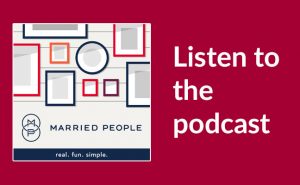 Links
Links
- Every Man Ministries website
- Kenny Luck on Facebook
- Kenny Luck on Twitter
- Dangerous Good book on Amazon
About Our Guest
Last week, we talked to our friend Karen Stubbs about being a great mom and a great wife. If you missed that episode, be sure to go back and give it a listen. This week, we’re talking more about the men’s side of the marriage equation.
To help us tackle this subject, Ted interviewed Kenny Luck—founder of Every Man Ministries, which is seeks to revolutionize how men’s ministry is done at local churches nationwide. They’ve got a bunch of online resources, which includes a blog and podcast.
Kenny is also a pastor at Crossline Church in California, and has written several books. He and his wife, Chrissy, have three grown children.
Before we dive into the conversation, we wanted to let you guys know about a new resource that we’ve created called the MarriedPeople Membership. It’s an online platform for married couples just like you. And it only costs $8/month or $80/year to get access to all of our premium resources in one place.
Interview
Tell us a little about yourself.
I was a Navy brat and the last of seven kids—five boys and two girls, so it was an interesting upbringing. When you have five boys all in one house, trouble is going to start. My mom is a pacific islander, so I have that island vibe in me. Chrissy and I have been married for 30 years and we have three awesome millennial kids.
How did you get started working in men’s ministry?
My pastor and good friend, Rick Warren, started Saddleback Church with a profile of a person. He knew that if you reach the man, you reach the family. The church began to grow and we asked how we could reach men in a more intentional way.
There wasn’t a very clear ecosystem to get a guy into a relationship with God, community with other men, and strong in his family. Rick asked me to do that and I went all in. Out of that work, we birthed Every Man Ministries.
What does men’s ministry look like strategically?
We made a decision to go after the pain in men’s’ lives. If the stats are correct, 9 of out 10 men have an issue in their lives they’d love help with—usually involving a relationship. We built our men’s outreach based on purpose, pain, and people. Those are three resonators with men.
When we launched this at Saddleback, it was built around what was already there—a hunger for purpose, to resolve private pain/temptation, and to do relationships right. That’s why it exploded.
The clarity and transparency seemed to be the secret sauce. Be clear with men and relevant. Men want to resolve things. They would show up to make the pain factor in their lives go down and out of a spiritual desire to please God.
The commission to all the ministry leaders at Saddleback was to get the kinks out and teach the world how to do it. Launching Every Man Ministries was intended to train the local church how to do men’s ministry. For some reason, there wasn’t an identity strong enough to pull men away from worldly identities. We knew we’re competing with those identities.
What are the issues facing men today?
The attack on male strength is something that’s a current challenge. Strength is not the issue—the issue is strength without character or compassion. When you have power, influence, strength, but don’t have character and compassion guiding that strength, people suffer.
Men are built to be strong but if they lack the character and compassion to guide that strength, it ends up becoming self-centered and abusive. What forms the inside of men is what guides their strength.
Why do you think it’s important for kids to see healthy marriages?
The family is the first community of acceptance. It’s responsible for the emotional and relational formation of children. If there aren’t healthy models, they will find a second community of acceptance outside the family to belong in.
Many times, it’s doing something unhealthy to be accepted in that second community. We’re talking about an all out war for the soul of your child and how they perceive themselves, which will cause them to be either secure or insecure on the inside.
Modeling is the strongest form of teaching in a family unit. If mom and dad model a spiritual life and a love for God, your child will absorb it. They’re waiting to see if you’re the real deal. You’re training them without even training them.
Much of parenting is a projection of our own stuff. You have to be on a journey of emotional and spiritual growth and health or it has a long-term consequence for how they’re forming. You can’t over-emphasize the importance of modeling in marriage for the health and development of children.
Did you and your wife grow up in homes where healthy marriages were modeled?
My wife, Chrissy, grew up in a reasonably healthy model. Her mom loved her dad and they spent time with kids. There was a healthy spiritual foundation and a focus on God and family.
I grew up getting thrown to the wolves. My dad was deployed all the time and my mom was handling seven children. If you throw in alcoholism, it adds another thing to dance around. There was a strong pull for me to find the second communities of acceptance, because the dominant feeling in my first community was ‘ignored’.
Chrissy grew up in a securely connected family where there was presence, love, affirmation. She wasn’t in deficit when it came to personal worth, self-esteem. I grew up in a family where that was not there. When Chrissy and I started dating, her family was a gospel witness to me of what it’s supposed to be like.
We need mentors and models. If you love Jesus, your husband and have a reasonably healthy family, that family has tremendous power to witness to kids in your community like me, who don’t have a vision of what a healthy family looks like.
How can couples prioritize marriage in the midst of the crazy schedules and kids?
Like all parents, depending on what season you’re in you have different things going on. You have to be a maximizer of moments and say ‘no’ to say ‘yes’. There were activities I could say ‘yes’ to, but I’d have to say ‘no’ to my marriage to do those.
When you have a lot of activities in your home, the first thing to go is time with your spouse. We had to invest financially in date nights and babysitters. We had to send the message to our kids that our relationship is important.
Whatever season you’re in, you have to have the snacks (the dates), the meals (a weekend here or there), and banquets (where you really go celebrate your relationship with your spouse). You can’t call it quality if you’re not slowing down to know the other person. You have to slow to know.
Tell us a little about the Dangerous Good Movement.
The movement started when Jesus said these words, “The spirit of the Lord is upon me and he has anointed me to preach the gospel to the poor, sight to the blind, relief to the oppressed, release to the captive.”
Translation: God’s spirit is in me to be dangerous with goodness. Jesus stepped in to protect and defend women, to bless the children, and not pre-qualify people on the basis of race. He walked into a broken masculinity.
The Dangerous Good Movement is a movement that is empowered by the spirit of Jesus Christ. It’s men who are in relationship with Him and one another. They’re focused on being like him and behaving like him. It’s my new book that just came out and the curriculum comes out in early 2019 and the conferences are coming to a city near you.
Your one simple thing for this week:
You’ve got to keep dating. Think about what you did when you were dating. Figure out something your spouse likes and make it a part of your routine. I get my wife her favorite coffee and leave her a note.
Second, learn something they desire or want and do that with or for them. For example, I heard my wife talking about how she’d love a shelf over the washer/dryer, so I built one for her while she was out. It doesn’t take a lot!
Show Closing
Thanks for joining us for the Married People Podcast. We hope you’ll subscribe to the podcast on iTunes and leave a review—they help us make the podcast better. And be sure to check out the brand new Married People Membership.
We want to hear from you. Share with us on Facebook, Instagram or our site. If you want more resources, check out Your Best Us.





